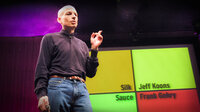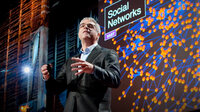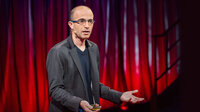Alan: In the TED Radio Hour titled "How Things Spread," Yuval Harari's presentation, "Why Did Humans Become The Most Successful Species On Earth?" is the most insightful talk.
Without stating his implicit conclusion, Harari makes the case that in order to thrive - and perhaps to survive - members of society (members of the human species?) need to believe in "shared stories."
Without shared stories to unify our collaborative drive toward The Common Good, our willingness to share and collaborate is at least diminished and may well become moribund.
This atrophy is apparent in America's ongoing culture war, largely facilitated by the ramification of media whose manifold outlets hinge on different (and often mutually exclusive) sets of belief.
I believe homo sapiens would wisely "buy into" the plausible (if not irrefutable) "story" that we are embedded in an interactive matrix-of-systems on whose complexity-and-entirety our survival depends, and that these interactive systems encompass not only the (known) Universe but every "thing" that may lie beyond the (known) Universe.
"There are more things in heaven and earth Horatio than are dreamt of in your philosophy."
Shakespeare
Happily, this "buy-in" is self-evidently satisfying -- emotionally, socially, politically and reasonably -- for the widest possible spectrum of human beings.
By subscribing to the "shared story" that we are embedded in a Matrix Of All-Encompassing-Interactive-Systems our subsidiary dependence on "something greater than ourselves" is immediately and centrally important.
I believe this "shared story" is a necessary prelude to ever-expanding engagement of Reality and serves as the specific antidote for personal and cultural solipsism.
I believe this "shared story" is a necessary prelude to ever-expanding engagement of Reality and serves as the specific antidote for personal and cultural solipsism.
Ongoing alignment with the discoverable lineaments of this Matrix Of All-Encompassing-Interactive-Systems optimizes happiness and health, locally and globally.
As we know from the underpinnings of personal health, we must take care of all biological systems that make possible a satisfying life --- assuming, of course, that "we" value life.
Lamentably, there will always be outliers who do not value life.
Fortunately, they are outliers.
Since The (Trans) Universal Matrix is intrinsically mysterious we are wisely advised to approach The Mystery with an intermingled sense of awe-reverence-wonder-curiosity.
Although a minor historical current in The West, Christianity's postulation of The Mysterium Magnum as one of God's names lays useful groundwork for rationalizing a shared system of belief --- a belief that need not (and should not) be religiously partisan --- a shared story that maximizes humankind's participation in a unifying credo.
Primary belief in the interactive oneness of The Mysterium Magnum does not preclude belief in particular religious traditions but rather serves as a prophylactic to the horrifying self-righteousness that undergirds Blaise Pascal's keen observation that...

Devout Christian, Blaise Pascal
http://en.wikipedia.org/wiki/
What's Wrong With The Abrahamic Religions: Absolutism, Scriptural Inerrancy, Bloodlust
What's Wrong With The Abrahamic Religions: Absolutism, Scriptural Inerrancy, Bloodlust
All 3 Abrahamic Religions Should Be As Ashamed Of Themselves As They Are Now Self-Certain
Abrahamic Religions Must Deal With Their Own Bronze Age Atavism And Not Just Window Dress
The Civil War: White Christians Slaughtering One Another On A Scale ISIS Can Only Dream Of
"What ISIS Really Wants" And How The Patriarch Abraham Appears To Be The Instigator
How Things Spread
What makes an idea, a brand, or a behavior catch fire? This hour, TED speakers explore the mysteries behind the many things we spread: laughter and sadness, imagination, viruses and viral ideas. http://www.npr.org/programs/ted-radio-hour/468877892/how-things-spread
1
Electric Counterpoint (Movement 3)Steve Reich
2
3
We're All ConnectedMedeski, Martin & Wood
4
5






No comments:
Post a Comment